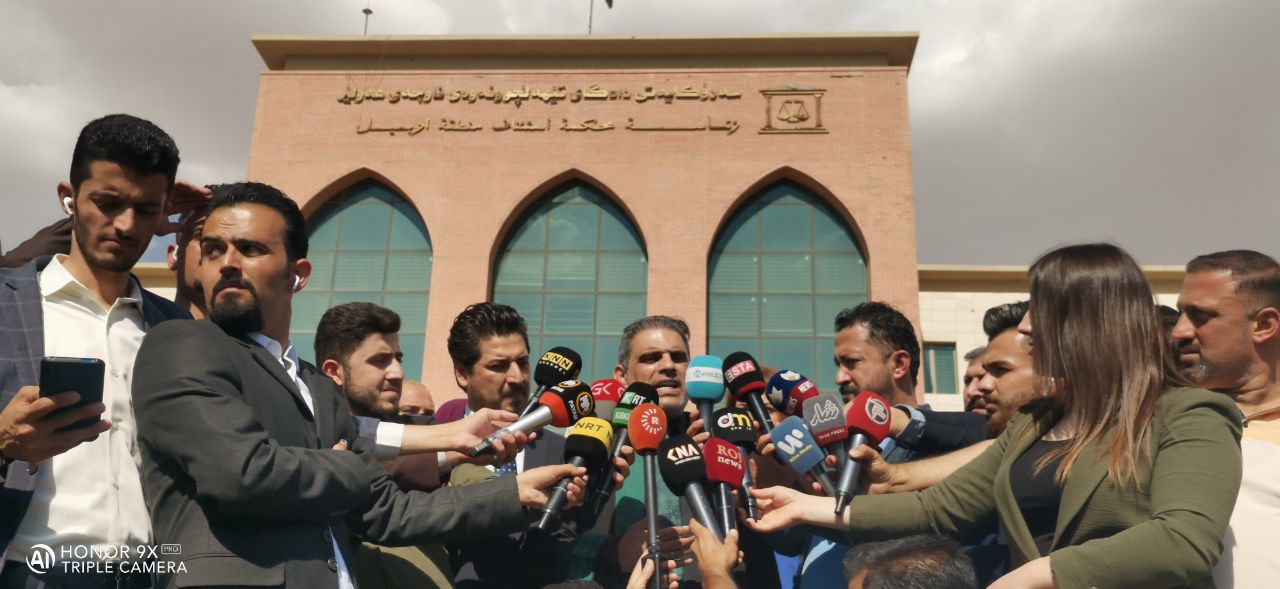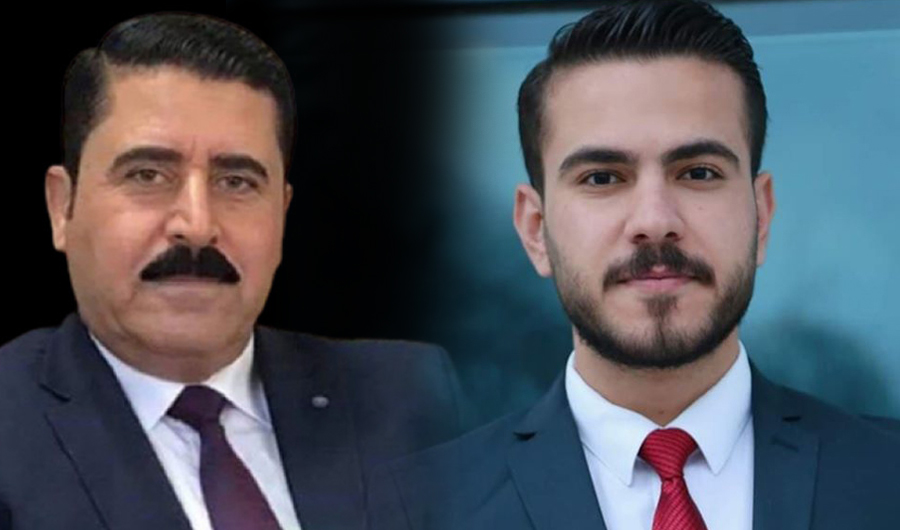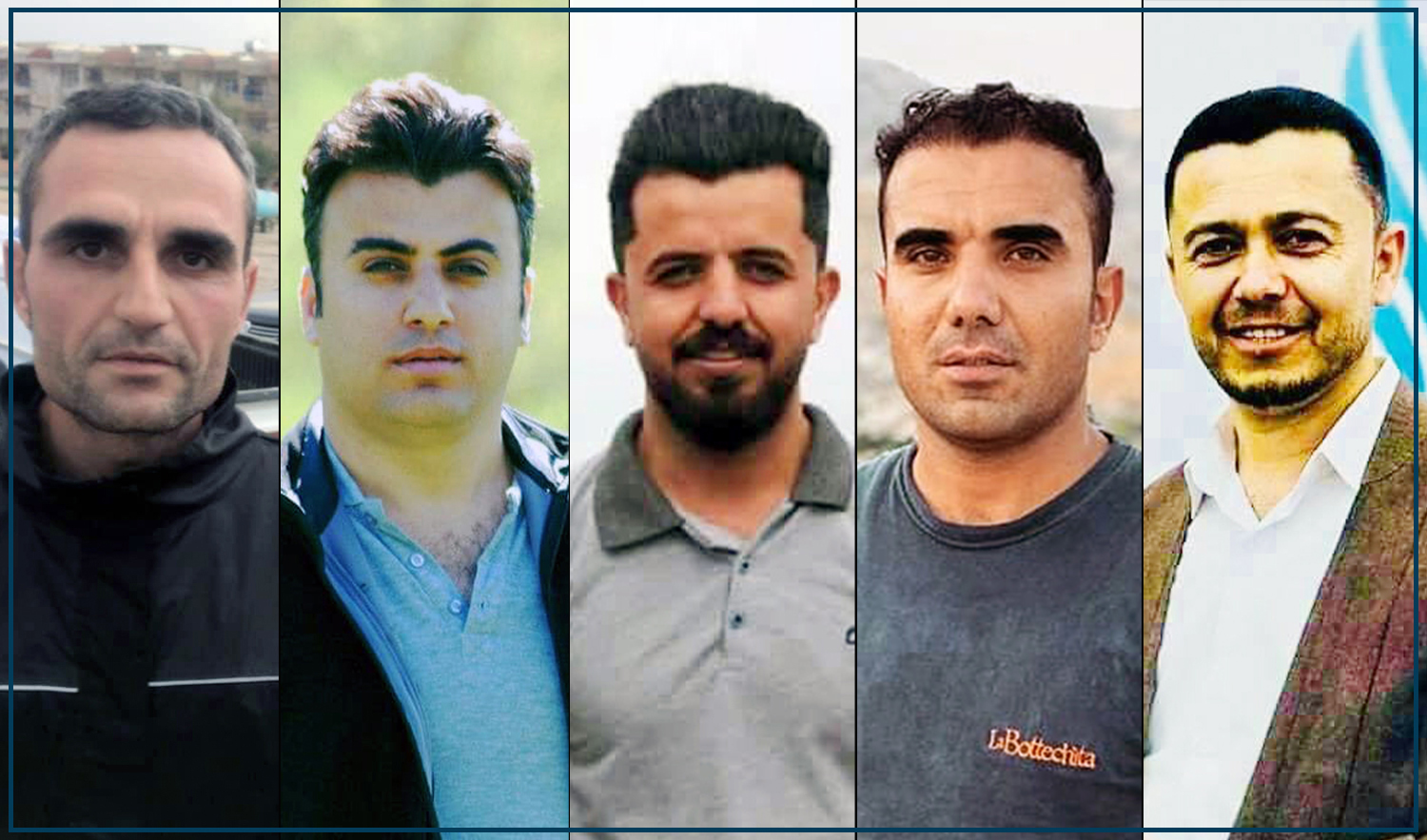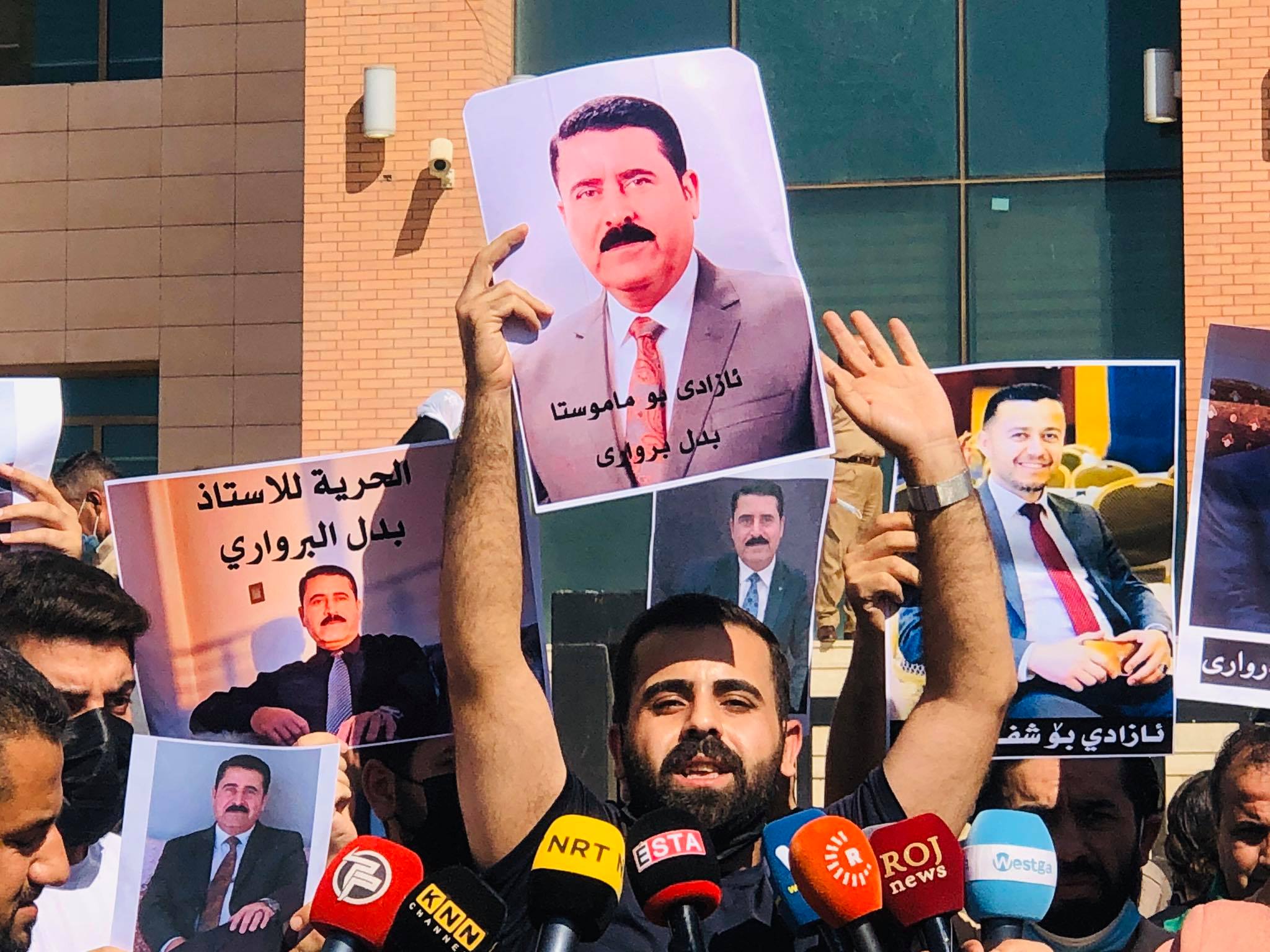Before calling in Badal Barwari, a teacher from Duhok, and Omed Baroshki, a freelance journalist, the court room was full of Asayish (Kurdish security) personnel in civil uniform which pushed the defense team to ask the jury to send them out yet in vain.
The court session was launched amid such a crowd. Following the interrogation, the defendants rejected the long pre-trial detention, process of investigation and trial.
Kamaran Osman, member of Iraq team for Christian Peacemaker Teams CPT, an NGO defending peace and freedom, who attended Tuesday October 19th court session said that Baroshki told the judge, "Your Excellency, 20 people were beating me by hand and Kalashnikov."
"The court room looked like a military base as there were many gunmen yet less than previous sessions. Baroshki told the judge that investigators asked him why he is working against the Barzani family and the KDP," Osman added, in reference to Kurdistan Democratic Party led by Masoud Barzani, father of the Masrour Barzani, Prime Minister of Erbil-based Kurdistan Regional Government KRG and uncle of Iraqi Kurdistan Region President IKRP Nechirvan Barzani.
The court has found both guilty for charges of espionage and undermining national security. They have been sentenced for one year in prison while they have been arrested in August 2020.
Several members of Iraqi Kurdistan region IKR parliament, relatives of Badinan detainees, and representative of human rights NGOs including the United Nations UN have attended the trial.
About 70 journalists and civic activists of Badinan (Duhok region) are in Asayish prison since last August, victims of a wave of arrests carried out by the KRG in response to a series of major protests against delay in salaries of state employees, KRG handling of the economic crisis resulting from disputes with Baghdad over oil production, export and corruption, and reached its peak under the Covid-19 pandemic.
Most of Badinan detainees, including Baroshki and Barwari, have gone on hunger strike for weeks against long pre-trial detention in the Asayish (prisons), unfair trials and poor imprisoning conditions as hundreds are detained in small detention cells and banned from seeing their relatives.
They are facing charges of espionage and undermining national security and tried per law Number 21 of 2003 of terrorism which states "any one deliberately in any form involved in an act aims at destabilizing security and stability of IKR or its sovereignty faced life sentence or imprisonment."
Iraqi and international media outlets and organizations, advocates & MPs expressed their grave concern that freedom of expression, press and journalists are increasingly under threat in the Kurdistan Region of Iraq.
Over 300 people were arrested from August to October 2020 per law number 21 of 2003 for charges of organizing demonstrations and disorder mostly in Duhok and 50 still in prison up today, the Independent Human Rights Commission in Kurdistan Region said.
CPT figures say that over 70 people were arrested in Badinan by the security forces and no appointment has been fixed for their trials as all are facing charges of terrorism per article two of law Number 21.

Erbil, October 19th 2021- Volunteer defense team of Baroshki and Barwari held a press conference in front of Erbil court following the trial. Firman Sadiq
The defense team and the families of the both detainees were thrilled that the judges have replaced law number 21 to article 222 of Iraqi penal code.
"The court has charged the law under which Baroshki and Barwari were tried and were convicted per article 222 of Iraqi penal code," said Harem Rafat, member of defense team.
The first clause of the article says "any gathering leads to a crime, misdemeanor, hinders imposing law or local authorities’ performance or the public, the perpetrators face imprisonment up to two years, fine or both."
The article finds guilty any one "calls for gathering, organize or participate in a gathering and realize its consequences including those who didn't refrain and were aware of its purpose."
The court has changed the article under which they were charged
Newar Baroshki, brother of Omed, welcomed the court verdict.
"Last week, I have visited Omed in Prison. He was in a very good health condition and his only demand was to be transferred into Zarka Prison in Duhok."
Baroshki faces several charges. He was convicted two days ago for six months while on September 23rd for one year imprisonment for a Facebook post criticizing Duhok police and governor. On June 22nd, he was found guilty for misuse of communication devices and charged of one year imprisonment and a fine of IQD240,000 ($160).
Adding today's verdict on top, Baroshki faces three and half years in prison deducting one year of detention since last year.
Rafat believes that Baroshki being a journalist should have been tried under press law.
"All the accusations against Baroshki and Barwari are incorrect and both rejected it in front of court. This time they were accused of aiding PKK and we said PKK is not prohibited in Kurdistan," in reference to Kurdistan Workers Party, fighting Turkey and holding territories in the IKR and the disputed territories.
The PKK accuses the KDP of having close ties with Turkey which pushes them to fight PKK while the KDP accuses PKK of occupying Iraqi territories in the mountains and Shingal district as well, complicating the security and political scene in Shingal and banning IDPs from volunteer return to their hometowns.
The PKK is listed as a terrorist organization by Turkey, the EU and US.

Barwari, on the left, and Baroshki were arrested in August 2020 following Duhok demonstrations for delay in payment of civil servants.
Barwari, born in 1965, has served as a Kurdish language teacher for 28 years. He has got a degree from University of Duhok in basic education and was vice-principal of Badinan School in Duhok ahead of being arrested on August 18th 2020.
He is married and has three children, two girls and a boy.
"We have formed the group of (Where are our savings). We have done nothing wrong and asked for our rights so we will go on with the group," said Marwan Doski, a close friend of Barwari who attended today's court session.
Several protests were organized across the IKR and following court sessions in support of Badinan detainees in support of the civic activists and journalists and condemned the crackdown by the KRG against its critiques.
"The court has referred that Barwari was arrested on October 25th 2020 so we asked them to amend it," Asso Hashim, the volunteer lawyer of barware told KirkukNow.
Barwari is to be released in a week per court records.
"The public prosecution has played a negative role and objected verdict by court which took the proofs into consideration. We will appeal the verdict as we believe there is no proof convicting Badal and unfairly charged," hashim added.

From the left: journalists and civic activists Ayaz Karam, Sherwan Sherwani, Hariwan Essa, Guhdar Mohammed Zebari and Shivan Sa'id were sentenced for 6-year-in-prison for undermining national security.
In June, the penal panel two of Iraqi Kurdistan Appellate Court in Erbil has issued its final verdict unanimously, confirming the court ruling of six-years-in-prison for freelance journalists Sherwan Sherwani, Guhdar Mohammed Zebari, and civil society activists Ayaz Karam, Hariwan Essa & Shivan Sa'id.
The five detainees were found guilty of "undermining national security" and sentenced to six years in prison by the Erbil Criminal Court on February, 16th.
Bashdar Hassan, one of the volunteer lawyers, said in the press conference said the court verdict against Barwari and Baroshki "is correct for the others" in reference to the five convicted in February and sentenced for six years in prison.
"Today's verdict is a proof how Sherwan Sherwani and his colleagues faced a great unfairness."
Today's verdict is a proof how Sherwan Sherwani and his colleagues faced a great unfairness
Court verdict was based on interrogation by Kurdistan region Asayish, security, which was in charge of questioning the detainees.
The conviction was based on bill number 21 approved by parliament of Kurdistan, Iraq, in 2003 which revoked item 156 of Iraq penal code stating that "any one purposefully in any means involved in an action that harms security, stability and sovereignty Iraqi Kurdistan region's institutions and causes damage will face life imprisonment or short term imprisonment."
The KRG accused Sherwani of spying immediately following his capture before court conviction. Dindar Zebari, the KRG’s Coordinator for International Advocacy, said that Sherwani "has received payments from foreign sides to disturb security of Kurdistan region.
Journalists, civil society activists and lawmakers condemned the conviction as a restraint of freedom of press and expression.
Baroshki said in a story published by KirkukNow last June that local officials have power over government office.
“By a phone call of an MP, I was detained for six days.”





